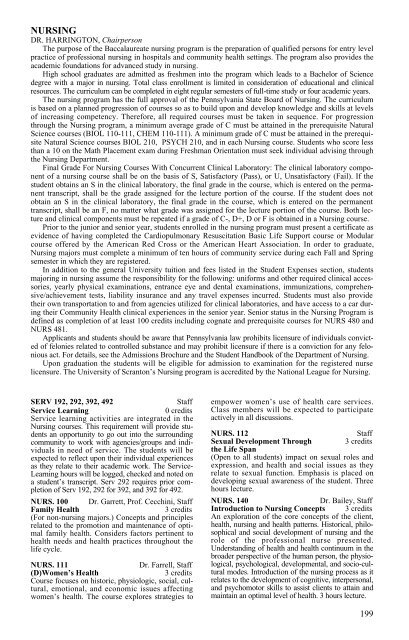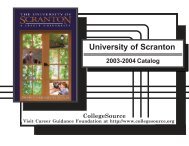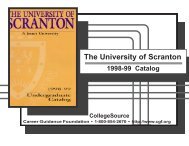You also want an ePaper? Increase the reach of your titles
YUMPU automatically turns print PDFs into web optimized ePapers that Google loves.
NURSING<br />
DR. HARRINGTON, Chairperson<br />
<strong>The</strong> purpose <strong>of</strong> the Baccalaureate nursing program is the preparation <strong>of</strong> qualified persons for entry level<br />
practice <strong>of</strong> pr<strong>of</strong>essional nursing in hospitals and community health settings. <strong>The</strong> program also provides the<br />
academic foundations for advanced study in nursing.<br />
High school graduates are admitted as freshmen into the program which leads to a Bachelor <strong>of</strong> Science<br />
degree with a major in nursing. Total class enrollment is limited in consideration <strong>of</strong> educational and clinical<br />
resources. <strong>The</strong> curriculum can be completed in eight regular semesters <strong>of</strong> full-time study or four academic years.<br />
<strong>The</strong> nursing program has the full approval <strong>of</strong> the Pennsylvania State Board <strong>of</strong> Nursing. <strong>The</strong> curriculum<br />
is based on a planned progression <strong>of</strong> courses so as to build upon and develop knowledge and skills at levels<br />
<strong>of</strong> increasing competency. <strong>The</strong>refore, all required courses must be taken in sequence. For progression<br />
through the Nursing program, a minimum average grade <strong>of</strong> C must be attained in the prerequisite Natural<br />
Science courses (BIOL 110-111, CHEM 110-111). A minimum grade <strong>of</strong> C must be attained in the prerequisite<br />
Natural Science courses BIOL 210, PSYCH 210, and in each Nursing course. Students who score less<br />
than a 10 on the Math Placement exam during Freshman Orientation must seek individual advising through<br />
the Nursing Department.<br />
Final Grade For Nursing Courses With Concurrent Clinical Laboratory: <strong>The</strong> clinical laboratory component<br />
<strong>of</strong> a nursing course shall be on the basis <strong>of</strong> S, Satisfactory (Pass), or U, Unsatisfactory (Fail). If the<br />
student obtains an S in the clinical laboratory, the final grade in the course, which is entered on the permanent<br />
transcript, shall be the grade assigned for the lecture portion <strong>of</strong> the course. If the student does not<br />
obtain an S in the clinical laboratory, the final grade in the course, which is entered on the permanent<br />
transcript, shall be an F, no matter what grade was assigned for the lecture portion <strong>of</strong> the course. Both lecture<br />
and clinical components must be repeated if a grade <strong>of</strong> C-, D+, D or F is obtained in a Nursing course.<br />
Prior to the junior and senior year, students enrolled in the nursing program must present a certificate as<br />
evidence <strong>of</strong> having completed the Cardiopulmonary Resuscitation Basic Life Support course or Modular<br />
course <strong>of</strong>fered by the American Red Cross or the American Heart Association. In order to graduate,<br />
Nursing majors must complete a minimum <strong>of</strong> ten hours <strong>of</strong> community service during each Fall and Spring<br />
semester in which they are registered.<br />
In addition to the general <strong>University</strong> tuition and fees listed in the Student Expenses section, students<br />
majoring in nursing assume the responsibility for the following: uniforms and other required clinical accessories,<br />
yearly physical examinations, entrance eye and dental examinations, immunizations, comprehensive/achievement<br />
tests, liability insurance and any travel expenses incurred. Students must also provide<br />
their own transportation to and from agencies utilized for clinical laboratories, and have access to a car during<br />
their Community Health clinical experiences in the senior year. Senior status in the Nursing Program is<br />
defined as completion <strong>of</strong> at least 100 credits including cognate and prerequisite courses for NURS 480 and<br />
NURS 481.<br />
Applicants and students should be aware that Pennsylvania law prohibits licensure <strong>of</strong> individuals convicted<br />
<strong>of</strong> felonies related to controlled substance and may prohibit licensure if there is a conviction for any felonious<br />
act. For details, see the Admissions Brochure and the Student Handbook <strong>of</strong> the Department <strong>of</strong> Nursing.<br />
Upon graduation the students will be eligible for admission to examination for the registered nurse<br />
licensure. <strong>The</strong> <strong>University</strong> <strong>of</strong> <strong>Scranton</strong>’s Nursing program is accredited by the National League for Nursing.<br />
SERV 192, 292, 392, 492 Staff<br />
Service Learning 0 credits<br />
Service learning activities are integrated in the<br />
Nursing courses. This requirement will provide students<br />
an opportunity to go out into the surrounding<br />
community to work with agencies/groups and individuals<br />
in need <strong>of</strong> service. <strong>The</strong> students will be<br />
expected to reflect upon their individual experiences<br />
as they relate to their academic work. <strong>The</strong> Service-<br />
Learning hours will be logged, checked and noted on<br />
a student’s transcript. Serv 292 requires prior completion<br />
<strong>of</strong> Serv 192, 292 for 392, and 392 for 492.<br />
NURS. 100 Dr. Garrett, Pr<strong>of</strong>. Cecchini, Staff<br />
Family Health 3 credits<br />
(For non-nursing majors.) Concepts and principles<br />
related to the promotion and maintenance <strong>of</strong> optimal<br />
family health. Considers factors pertinent to<br />
health needs and health practices throughout the<br />
life cycle.<br />
NURS. 111 Dr. Farrell, Staff<br />
(D)Women’s Health 3 credits<br />
Course focuses on historic, physiologic, social, cultural,<br />
emotional, and economic issues affecting<br />
women’s health. <strong>The</strong> course explores strategies to<br />
empower women’s use <strong>of</strong> health care services.<br />
Class members will be expected to participate<br />
actively in all discussions.<br />
NURS. 112 Staff<br />
Sexual Development Through 3 credits<br />
the Life Span<br />
(Open to all students) impact on sexual roles and<br />
expression, and health and social issues as they<br />
relate to sexual function. Emphasis is placed on<br />
developing sexual awareness <strong>of</strong> the student. Three<br />
hours lecture.<br />
NURS. 140 Dr. Bailey, Staff<br />
Introduction to Nursing Concepts 3 credits<br />
An exploration <strong>of</strong> the core concepts <strong>of</strong> the client,<br />
health, nursing and health patterns. Historical, philosophical<br />
and social development <strong>of</strong> nursing and the<br />
role <strong>of</strong> the pr<strong>of</strong>essional nurse presented.<br />
Understanding <strong>of</strong> health and health continuum in the<br />
broader perspective <strong>of</strong> the human person, the physiological,<br />
psychological, developmental, and socio-cultural<br />
modes. Introduction <strong>of</strong> the nursing process as it<br />
relates to the development <strong>of</strong> cognitive, interpersonal,<br />
and psychomotor skills to assist clients to attain and<br />
maintain an optimal level <strong>of</strong> health. 3 hours lecture.<br />
199
















